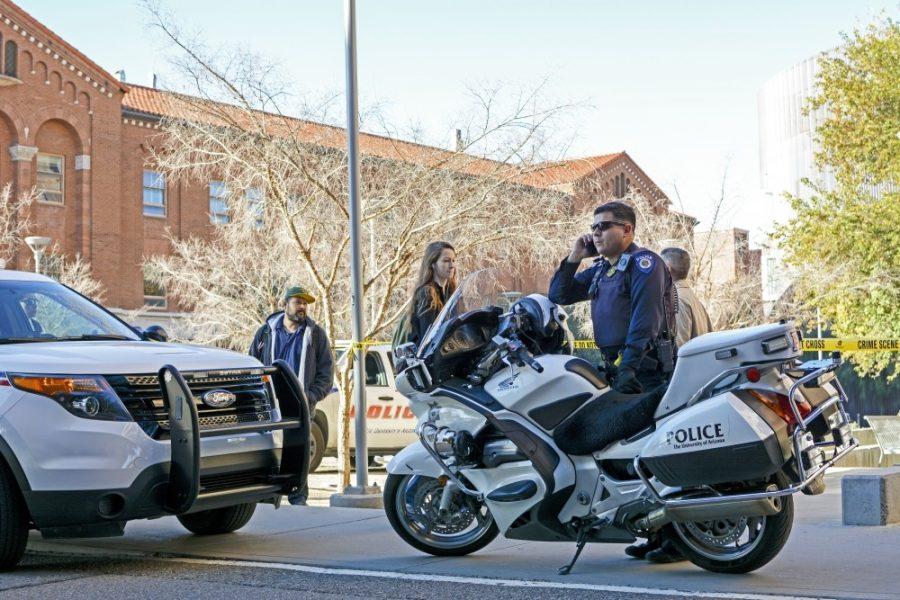Tucson’s Police Department worries about losing officers while Tucsonans worry about losing their lives to TPD.
City council members want to increase officer involvement in Tucson, while many community members shiver in fear every time they are pulled over by a cop.
In a June City Council Meeting, Tucson Mayor Regina Romero and council members approved a $2.2 billion budget for Tucson in the 2023-2024 fiscal year. The budget included $195 million for Tucson’s Police Department.
In recent years the department’s biggest public safety issue has not been lack of funding but lack of people, according to Ward 2 council member Paul Cunningham.
Cunningham noted that the department needs more than the usual squad car patrolling an area; they are in dire need of mental health workers, social workers and community service officers in order to ensure public safety.
Cunningham also discussed the opportunity of having retired officers pick up shifts in order to have more “boots on the ground.”
“We also have the ability for the team to be more collaborative when they respond to different situations,” Cunningham said.
Under Chief of Police Chad E. Kasmar’s leadership, retaining team members in the department has been his number one priority. Especially after last year’s loss of 35 retired officers.
“Thirty five team members, at a minimum of 20 years of experience, is over 700 years of experience; and when we talk about the complexities of harm reduction, and tranq and fentanyl, and then the shelter population, the skills needed to meet the community’s demands come with experience,” Kasmar said in a City Council meeting.
TPD has more officers per population than 34% of other police departments in the country with 820 officers, according to Police Scoreboard, a website that looks at police department funding, violence and accountability.
While the department focuses on keeping officers on the ground, Tucsonans worry about their safety if police involvement in their communities increases.
Just Communities Arizona, an organization in Tucson dedicated to reimagining the approach to and process of justice, made a survey to learn how Tucsonans can feel safer in their communities.
Only 4% of those surveyed believed that there should be more police involvement in their communities. Affordable housing, mental health services and better-resourced schools were the top three answers from people.
Tucson native Dulzayra Gonzalez believes police brutality is an issue for people of color in Tucson, but believes police targeting people of color is the main issue.
The Tucson Police Department is 3.4 times more likely to kill a black person and 1.1times more likely to kill a Latinx person over a white person.
From 2013 to 2021 TPD has been responsible for 40 deaths, more killings than 52% of other police departments in the country.
TPD has used more deadly force on unarmed people than 38% of other departments in the country.
“We see it all the time here on the south side [Tucson] or on the Pascua Yaqui reservation. There are police cars on every street corner and if you go to the north side, you don’t see that,” Gonzalez said.
Gonzalez, 19, is a Mexican-American who feels fear and anxiety every time she is pulled over by an officer, because it feels like they are always accusing her of something.
“My eyes instantly get watery. I get terrified. When I see a white cop get out of the car I am so scared. At that moment those people are the only people that have power over me and they get away with so much it’s insane to think of the outcome of the situation,” Gonzalez said.
Along with those surveyed by Just Communities Arizona, Gonzalez believes there are better options than increased officers on the streets. Tucson needs authority, but not authority that is feared by people of color.
Author and professor Stefano Bloch studies and writes about cultural geography and critical criminology at the University of Arizona. Bloch believes that there is not much the Tucson government can do to ensure that officers are not racially biased.
Black and Latinx residents being disproportionately more likely to suffer violence by police should be an analysis in a broader social context.
“Looking for racist cops will leave you searching forever, with few findings.” Bloch said.
Bloch believes police officers need to be trained and chosen for how well they can avoid violence, not on how tough they are. Bloch thinks this can start by removing the hero worship of cops as defenders and start seeing them as public servants who work with the community and not against it.
“Rather than training officers to do the right thing, we need to recruit officers who want to do what’s right,” Bloch said.
Greater exposure to diversity through real world experience as well as higher education is the best way to change racial bias in officers, according to Bloch.
Follow the Daily Wildcat on Instagram and Twitter/X









